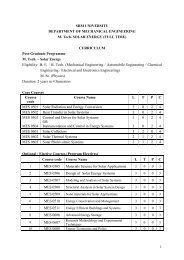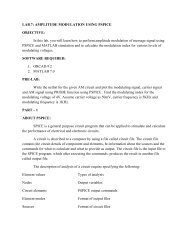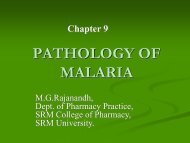âForensic Clinical Psychology as an Emerging ... - SRM University
âForensic Clinical Psychology as an Emerging ... - SRM University
âForensic Clinical Psychology as an Emerging ... - SRM University
You also want an ePaper? Increase the reach of your titles
YUMPU automatically turns print PDFs into web optimized ePapers that Google loves.
Mental retardation <strong>as</strong>sociated with deficits that affect most of the are<strong>as</strong> of functioning <strong>an</strong>d are<br />
persistent. In contr<strong>as</strong>t, severe traumatic brain injury may result in global deficits or alternately<br />
might result in focalized deficits with other are<strong>as</strong> of functioning remaining intact. Further, in brain<br />
injury c<strong>as</strong>es functional deficits may improve over time with treatment (Lezak, 1995). In certain c<strong>as</strong>es<br />
involving mentally retarded individuals, it is desirable to do a comprehensive neuropsychological<br />
evaluation in addition to <strong>as</strong>sessment of intellectual <strong>an</strong>d adaptive functioning to available specific<br />
functional are<strong>as</strong> such <strong>as</strong> l<strong>an</strong>guage skills, executive functioning etc. That might be relev<strong>an</strong>t to a<br />
particular forensic issue.<br />
Characteristics of the Mentally Retarded offender: Regarding intelligence <strong>an</strong>d adaptive functioning,<br />
mentally retarded defend<strong>an</strong>ts have specific deficits in social functioning <strong>an</strong>d re<strong>as</strong>oning which affect<br />
the judicial process. Some other characteristics also undermine the mentally retarded individual’s<br />
ability to participate in defense. However some individuals are considered competent to confess,<br />
to st<strong>an</strong>d trial, or to make intelligent decisions <strong>an</strong>d are convicted, Failing to underst<strong>an</strong>ds their rights,<br />
confused by the process, <strong>an</strong>d agreeing with statements <strong>an</strong>d decisions, which are unfair <strong>an</strong>d not<br />
to their benefit are not fit a st<strong>an</strong>d trial. Forensic psychologist should <strong>as</strong>sist the defend<strong>an</strong>t’s true<br />
functioning <strong>an</strong>d underst<strong>an</strong>ding. Other sources of information may provide additional information<br />
about the individuals typical functioning.<br />
Nature of Crimes committed by Mentally Retarded Individuals: Individuals with mental retardation<br />
may be susceptible to particular types of crimes because of the nature of their deficits. Poor impulse<br />
control, limited pl<strong>an</strong>ning ability, judgment <strong>an</strong>d poor coping skills that cause difficulty in day-today<br />
functioning c<strong>an</strong> provide the background to criminal behavior (Kinsler, Saxm<strong>an</strong>, <strong>an</strong>d Fishm<strong>an</strong>,<br />
2004). The violent, out - of control mentally retarded offender: usually charged with committing<br />
misdeme<strong>an</strong>ors <strong>an</strong>d less serious crimes (White <strong>an</strong>d Wood, 1986). M<strong>an</strong>y commit crimes that they do<br />
not fully underst<strong>an</strong>d. When a crime h<strong>as</strong> been committed, they usually do not run away <strong>an</strong>d hence<br />
first to be caught. Mentally retarded offenders have poor impulse control <strong>an</strong>d inhibitory behaviors.<br />
Assaultive behaviors frequently seen with institutionalized individuals with mental retardation.<br />
Estimate of aggressive behavior causing injury to others is 36.9% (Hill <strong>an</strong>d Bruinink, 1984). Individuals<br />
who are forensically hospitalized for aggression, the rates of post admission aggression indicates<br />
a higher prevalence of 46.5% (Novaco <strong>an</strong>d Taylor, 2004) Further, studies have suggested that <strong>as</strong><br />
intellectual functioning declines, there is a rise in the rate of aggression (Hill <strong>an</strong>d Bruinink, 1984;<br />
Novaco <strong>an</strong>d Taylor, 2004). Violent crimes such <strong>as</strong> <strong>as</strong>sault <strong>an</strong>d homicide are unpl<strong>an</strong>ned responses<br />
to intense feelings of fear, <strong>an</strong>ger, or p<strong>an</strong>ic, occ<strong>as</strong>ionally resulting when <strong>an</strong>other crime goes wrong.<br />
Sexual offenses are also common in the forensic population with mental retardation. Estimates<br />
suggest that mentally retarded individuals commit approximately 10-15% of all exposure, sexual<br />
touching, <strong>an</strong>d other minor offense (Day, 1997). Retrospective <strong>an</strong>alysis demonstrates that m<strong>an</strong>y of<br />
these individuals are lacking in adequate training concerning appropriate expressions or lack or<br />
absence of appropriate underst<strong>an</strong>ding of social rules.<br />
The prevalence of psychiatric disorder in individuals with mental retardation is four to six times<br />
greater th<strong>an</strong> the general population (McLe<strong>an</strong>, 1993).The symptoms of psychiatric disorders present
















